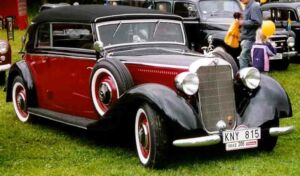News
Dane to sell his rare vintage cabriolet with a bloody Nazi past
This article is more than 10 years old.
The car is believed to have been driven by one of the main architects of the Holocaust

This is a 1939 Mercedes-Benz 230 Cabriolet B very similar to the one Lauritzen is selling on May 25 (photo: Lars-Göran Lindgren)
A vintage cabriolet believed to be the very car in which Reinhard Heydrich, a high-ranking German Nazi official, was assassinated in 1942, is for sale in Denmark.
The 1938 Mercedes-Benz Cabriolet B belongs to Lauritz Lauritzen, a former employee of Mercedes Benz.
11 years of restoration work
Lauritzen bought the cabriolet in 1980, and it took him eleven years to restore it and make it fully functional again.
“I have been producing cars since 1956, and no other car runs as good as this one,” Lauritzen told Ekstra Bladet.
Did Heydrich truly drive this car?
Only 34 cars of this exact model were manufactured, and some historians claim Lauritzen’s cabriolet is the very car in which the ‘butcher of Prague’ was killed in 1942.
However, it has not been possible to obtain any objective evidence verifying that Heydrich truly drove this specific car.
Luxury cars auction in Aarhus
The vintage car will be offered for sale on May 25 at the BCA Car auction in Aarhus, which specialises in classic, sports and luxury cars.
The auction is expected to attract buyers and sellers from all over Europe. It is believed that Lauritzen’s car could fetch up to 3.5 million kroner.










































